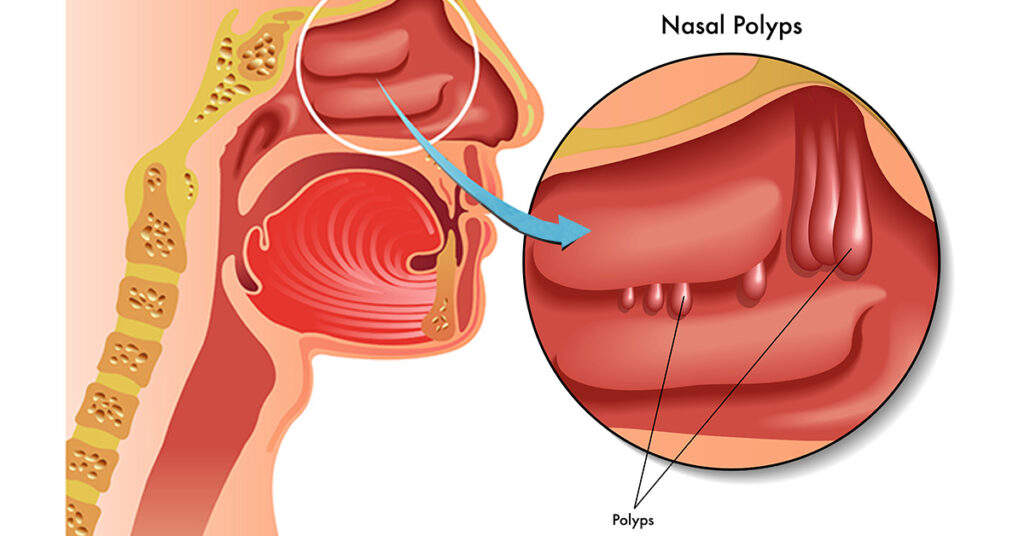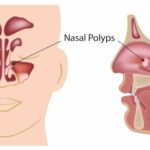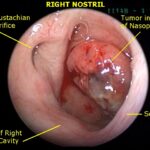Nasal polyps are noncancerous, soft, and painless growths that develop on the lining of the nasal passages or sinuses due to chronic inflammation. These teardrop-shaped growths can lead to nasal congestion, breathing difficulties, and a diminished sense of smell.

Causes and Risk Factors
Nasal polyps are often associated with persistent inflammation in the nasal passages and sinuses. Common conditions that contribute to their development include:
- Chronic sinusitis – Long-term inflammation of the sinuses
- Asthma – A respiratory condition that causes airway inflammation
- Allergic rhinitis – Also known as hay fever, triggering nasal irritation
- Cystic fibrosis – A genetic disorder affecting mucus production
- Aspirin sensitivity – Some individuals have adverse reactions to aspirin, leading to nasal polyps
- Immune system disorders – Inflammatory diseases like Churg-Strauss syndrome
Symptoms of Nasal Polyps
While small nasal polyps may not cause noticeable symptoms, larger or multiple polyps can result in:
- Persistent nasal congestion
- Runny nose or postnasal drip
- Reduced or lost sense of smell (anosmia)
- Frequent sinus infections
- Headaches and facial pressure
- Snoring and sleep disturbances
- Difficulty breathing through the nose
Diagnosis of Nasal Polyps
A physician diagnoses nasal polyps through:
- Physical Examination – Using a nasal endoscope to inspect the nasal cavity
- CT Scan or MRI – Imaging tests to determine polyp size and extent
- Allergy Testing – To identify underlying allergic conditions
- Nasal Endoscopy – A fiber-optic camera is used to detect polyps inside the nasal passages
Treatment Options for Nasal Polyps
1. Medications
- Corticosteroid Nasal Sprays – Reduce inflammation and shrink polyps (e.g., fluticasone, mometasone)
- Oral Corticosteroids – Short-term use for severe cases (e.g., prednisone)
- Antihistamines – Help control allergies and prevent further irritation
- Leukotriene Modifiers – Medications like montelukast may reduce inflammation
- Saline Nasal Irrigation – Rinsing nasal passages with saline solution clears mucus buildup
2. Surgical Treatment
- Endoscopic Sinus Surgery – A minimally invasive procedure to remove large or persistent polyps
- Polypectomy – Surgical removal of polyps using specialized instruments
3. Home Remedies and Lifestyle Changes
- Use of a Humidifier – Keeps nasal passages moist
- Steam Inhalation – Helps clear mucus and soothe nasal tissues
- Allergy Management – Avoiding allergens that trigger inflammation
- Proper Hydration – Drinking plenty of fluids to reduce mucus buildup
Prevention of Nasal Polyps
To minimize the risk of nasal polyp formation, consider:
- Managing allergies and asthma effectively
- Using saline nasal sprays to keep nasal passages moist
- Avoiding irritants such as smoke, strong odors, and pollutants
- Maintaining good nasal hygiene and using air purifiers
Complications of Untreated Nasal Polyps
If left untreated, nasal polyps may lead to:
- Frequent Sinus Infections – Due to blocked nasal passages
- Obstructive Sleep Apnea – Breathing difficulties during sleep
- Severe Asthma Attacks – Worsening of asthma symptoms
- Facial Deformities (Rare Cases) – Long-term sinus pressure affecting facial structure
Nasal polyps are a common but treatable condition that can significantly impact breathing and overall quality of life. With proper medical intervention, lifestyle changes, and preventive measures, individuals can manage symptoms effectively and prevent recurrence. If you experience persistent nasal congestion or sinus issues, consulting a healthcare provider for diagnosis and treatment is crucial.

